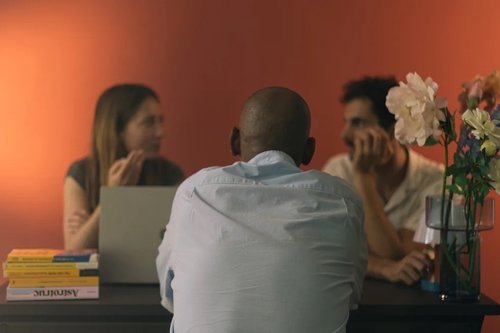Ace the interview: smart ways to discuss your weaknesses
Nov 28, 2022 - updated Apr 17, 2023
8 mins


Journaliste web
Going into an interview, your primary aim is to make yourself look good—or at least like the right person for the job. You want to draw attention to your best points. Weaknesses? Not so much. But what if we told you that talking about your weaknesses can actually improve your chances of getting hired?
Let’s be clear: the recruiter already knows you’re not perfect. Every candidate has their own unique blend of strengths and weaknesses, but the question is how those strengths and weaknesses will work in a specific position. The problem? Candidates are often unwilling to talk about the negative sides of their personalities. When put on the spot, they may come out with something like, “I’m too much of a perfectionist,” a classic attempt to present a strength as a weakness, and something recruiters see right through. Don’t fall into the trap: by giving a sincere, well-thought-out answer, you have the chance to really impress an interviewer. Christophe Schnoebelen, author and learning and development specialist, is here to give us a few pointers for talking openly about your weaknesses in a way that’s sure to impress.
Why is it so important to know how to talk about your weaknesses?
First and foremost, recruiters aren’t out to “destabilize, trick, or confuse you,” says Schnoebelen: “Their aim is to find the right person for the job.” If they ask you to talk about your weaknesses, it isn’t a trap—after all, nobody’s perfect—but “a way to assess the candidate’s level of self-knowledge,” insists the expert.
If you truly want to get to know someone, you need to look at all angles, even those they’d rather you didn’t see. The same is true in an interview: recruiters want to understand who you are as a person. “In an interview, the aim is to touch on all aspects of a candidate’s personality to see how we might work together in the future,” says Schnoebelen. That means digging below the surface, something candidates don’t often enjoy. Cue the dreaded but ubiquitous question: “What is your greatest weakness?”
Knowing how to talk about your weaknesses is a sign of honesty and demonstrates your capacity for self-analysis, in both a personal and professional context. Taking an objective look at yourself helps you to analyze who you are, and is an essential first step on the path to personal improvement. Recruiters appreciate this type of self-awareness, as it demonstrates a desire to do better.
For Schnoebelen, honesty and authenticity are key: “I prefer when candidates are open about their difficulties but are willing to learn and have thought about ways of improving their skills, rather than lying about their ability and risking being disqualified from the hiring process.”
Understanding your weaknesses is a sign of emotional maturity. Self-awareness isn’t something that comes across on a resume, but it can be hugely beneficial if you’re looking to increase efficiency or build harmony in a team. For example, if you tell a recruiter that you’re easily distracted, you could go on to describe the techniques you’ve developed to manage this tendency. Schnoebelen suggests talking about “areas for improvement” rather than “weaknesses.” That way, you demonstrate awareness of your shortcomings, but also show that you’re willing to grow both personally and professionally.
How to identify your weaknesses
Before you can talk about your weaknesses, you need to know what they are and how they relate to your professional profile. This is an area where thinking ahead really pays off—self-awareness isn’t something that’s easy to improvise!
A healthy level of introspection
The Ancient Greeks knew the value of self-analysis: “Know Thyself” was the first of the three maxims carved into the Temple of Apollo at Delphi. For some, looking inwards comes naturally. For others, who’ve never tried to think about their personality from an objective standpoint, the exercise is harder. That said, it’s far from impossible.
One way of improving your self-knowledge is to take a personality test. There’s a wide range of options out there designed to highlight the main aspects of your personality. That said, the merits of these tests, such as the famous Myers-Briggs (INFJ, ESTP, ENFP), are debatable. They’re not exactly precise and have a tendency to reinforce people’s entrenched ideas about themselves instead of teaching them anything new. In short, do it if you like, but take the results with a healthy pinch of salt.
Even if you think you already know your weaknesses, it’s worth taking the time to sit down and write out a list. That way, it’ll be easier to decide which ones you want to talk about in an interview and develop your ideas further.
Think about times in your life when your weaknesses stand out. Were you always first up on Christmas morning, ripping the paper off your gifts before anyone else could get a look in? Maybe you’re impatient (or nosey, you choose). Have you ever bought last-minute plane tickets on a whim? Then you might be impetuous. Did you spend half your savings on painting classes, then photography lessons, then buying a saxophone? Clearly, you’re a passionate person—and that’s a good thing—but you lose interest quickly. Look at your life like you’d analyze a character in a book, digging deep into the details.
Make sure you pay as much attention to your professional weaknesses as to your personal shortcomings: these are the points that recruiters will want to hear most about. While some weaknesses apply across the board (say you’re impatient, chatty, or impulsive), others tend to be more visible in a workplace setting (bossiness, ambition, disorganization, etc.).
Ask for help
If you’re still struggling to identify your main weaknesses, call in reinforcements! Ask people you see or work with on a regular basis: friends, family, colleagues, or former colleagues. As humans, we’re pretty great at being critical of others, so there’s a good chance that your friends and family will have no difficulty telling you about your shortcomings. Some of the things they say might be hard to hear, but whatever you do, don’t get upset: the aim is to help you get the job of your dreams, not to humiliate you!
The good news is that you may already have some of the information you’re looking for. If you have feedback from recent professional experiences, take time to comb through it for clues and pinpoint areas where you could do better.
Should I be totally honest?
It should be obvious, but it bears repeating: lying on your resume is never a good idea. But what about lying in an interview? Could you hurt your chances of getting the job by over-sharing? Should you lie, and risk losing credibility, or tell the interviewer all your deepest, darkest secrets while desperately hoping they won’t penalize you for it?
Lying is bad …
Let’s be clear: if you “massage” the truth too much, or if you’re hypocritical, you’re going to lose face. Everyone has that “smart” (and often unemployed) friend who’ll tell you to present one of your strengths as a weakness: “I’m too curious,” “I’m too dedicated to my work,” “I’m too much of a perfectionist.” Don’t listen to them! Recruiters will see right through this kind of ploy, and it won’t do you any favors. Even if there’s an element of truth in what you’re saying, the fact that it sounds like a cliché means that it should be a no-go. The aim is to stand out, not blend in!
… but being too honest can be risky
Yes, you should be honest, but be smart about it. Be strategic about the weaknesses you bring up in an interview: avoid mentioning things that are likely to get you into trouble. A recruiter isn’t going to cross you off the list for being competitive. Say you’re lazy or a bad team player, though, and you might regret it. Use your brain and be intentional about what you share, that way you can stay authentic without damaging your chances at the job. Schnoebelen recommends “focusing on weaknesses that are connected to the position.” The recruiter’s priority is to “see how a candidate would fit into their team and how they correspond to the advertised role.”
Something to note is that while you may want to keep certain weaknesses to yourself, you need to think long and hard about whether they’re compatible with the job you’re applying for. If you’re impatient and don’t suffer fools gladly, then a customer relations role might not be the best fit for you. By working on these points in advance, you’ll save yourself—and the recruiter—valuable time and energy.
How to talk about your weaknesses
Once you’ve identified your weaknesses, the next step is to learn to talk about them. The interviewer isn’t going to ask you for a thirty-minute presentation on your shortcomings, but they will want some details. Saying “I’m too competitive,” with no further explanation just won’t cut it. Elaborate: explain what you mean and give examples. Why is being too competitive a weakness, in your view? In what circumstances might it be problematic? Can you talk about times you’ve come up against this issue, and how you handled it? Show that you understand your weaknesses and their possible consequences for your professional life and that you’re ready and willing to work on these areas.
Tell the recruiter about steps you’ve already taken to improve on your weak points. Once again, you need to go into detail. Saying, “I read an article talking about people who are too competitive,” is a good start, but nowhere near enough. Demonstrate your willingness to grow and show that you’ve thought about specific things you could do. Look at the example below, for a person who considers themselves to be too competitive and always needs to be the best:
“I’ve been working with a personal development coach in my own time for the last six months. I’ve realized that I compare myself to others too much, because, deep down, I lack confidence. It’s something I talked with my old manager about quite a lot because I didn’t want it to have an impact on my work or on my colleagues. I’ve come to accept that nobody’s perfect and that there’ll always be someone better than me. The latest article I read about being competitive made me realize that it can also be a strength if it’s harnessed and expressed correctly in a professional context.”
Examples of weaknesses to talk about in an interview
The human species is made up of individuals with wildly different personalities: it’s what makes us so fascinating and what makes each encounter unique. The list of human weaknesses, then, is almost endless. (If that sounds too depressing, just remember that the same is true of human strengths—there are two sides to every story!). Here are a few examples you could mention (as long as they’re not incompatible with the job you’re applying for—you may be out of the running for “international man of mystery”):
“I’m chatty”
“I’m competitive”
“I’m an idealist”
“I have a reactionary streak”
“I’m stubborn”
“I have difficulty saying no”
“I’m shy”
“I’m hypersensitive”
“I get stressed easily”
“I’m a bit of a dreamer”
“I’m clumsy”
Beware of the “humble brag”
We’ve already mentioned the idea of presenting a strength as a “weakness.” This is a prime example of the most ridiculous of beasts: the “humble brag.” Recruiters see right through it. Besides the fact that they’re often false and reveal a hypocritical side of you, they prevent the recruiter from getting to know you better:
“I’m a stickler for principles”
“I have an insatiable thirst for knowledge”
“I’m hyperactive”
“I can’t stop working”
“I’m too much of a perfectionist”
“I always have too many ideas”
“I’m afraid of failure”
Weaknesses to keep quiet about
As we’ve already seen, there are some weaknesses that are better kept to yourself. Here are a few things we wouldn’t want to say to a potential employer:
“I’m a technophobe”
“I’m not a good team player”
“I’m authoritarian”
“I’m jealous”
“I’m grumpy”
“I don’t take orders well”
“I’m erratic”
“I’m lazy”
“I’m arrogant”
“I never finish what I’ve started”
Don’t forget that there are two sides to every coin. There are positives and negatives to almost every personality trait. Everything depends on how it plays out in your behavior or your performance. Schnoebelen puts it succinctly: “A weakness is a quality pushed to extremes.” Ambition, for example, is often a strength in a professional context, as it shows willingness and drive. Take it too far, though, and it can look like bootlicking or opportunism. Another example: do you take your time with your work? In some contexts, that “slowness” is a hindrance; in other areas, a meticulous approach is crucial, and far more important than speed. Think about your weaknesses from all angles, that way you can make sure recruiters see your best side!
Translated by Catherine Prady
Photo: Welcome to the Jungle
Follow Welcome to the Jungle on Facebook, LinkedIn, and Instagram and subscribe to our newsletter to get our latest articles every week!

More inspiration: Ace your job interview

Why are you leaving your job? Here's how to nail the answer
Caught off guard by 'Why are you leaving your job?' Here's how to flip this tricky question into a spotlight on your goals and potential.
Dec 24, 2024

Standing out in an interview: Creative responses to common questions
Answering common interviews with common responses isn't going to get you far in today's job market. Here's how to truly stand out!
Nov 26, 2024

The Pratfall Effect: Can screwing up in a job interview make you more likable?
Mistakes you make in a job interview could actually work to your advantage ...
Oct 14, 2024

How to bring up your long-term career goals in an interview
Be honest but strategic. The key is aligning your goals with the role while showing flexibility and ambition. Avoid faking it!
Sep 24, 2024

Is honesty the key to discussing your weaknesses?
Are your weaknesses holding you back in an interview? A bit of honesty can flip the script and make your flaws work in your favor.
Aug 21, 2024
The newsletter that does the job
Want to keep up with the latest articles? Twice a week you can receive stories, jobs, and tips in your inbox.

Looking for your next job?
Over 200,000 people have found a job with Welcome to the Jungle.
Explore jobs